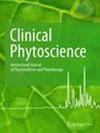The modulation effect of green tea and pumpkin oils on hyperlipidemia, oxidative stress, and hematological abnormalities in an experimental multiple sclerosis rat model
引用次数: 0
Abstract
Multiple sclerosis (MS) is a chronic inflammatory condition that can impair the body’s physiological functions. Although many diseases have been successfully treated with herbal treatments for a long time, the majority of the herbs utilized have unclear mechanisms. Therefore, this study aimed to examine the modulation effects of green tea oil (GTO) and pumpkin oil (PO) on hyperlipidemia, oxidative stress, and hematological abnormalities in an experimental multiple sclerosis rat model. Forty albino male Wistar rats (weighing 120–140 g) were divided into four groups of six each: group 1, the control group; group 2, the myelin oligodendrocyte glycoprotein (MOG)-injected group; and groups 3 and 4, the MOG-injected groups treated with GTO and PO at 5 mg/kg b.w., respectively. At the end of the experiments, animals were anesthetized with diethyl ether inhalation, and blood samples were collected from the jugular vein. A Beckman Coulter was then used to determine the differential complete blood counts. The obtained serum was rapidly collected and stored at 20 °C to assess the lipid profile and oxidative stress and antioxidant biomarkers. Our findings showed that GTO and PO treatment produced a significant reduction in total cholesterol (TC), triglycerides (TG), high-density lipoprotein-cholesterol (HDL-C), low-density lipoprotein-cholesterol (LDL-C), and very low-density lipoprotein-cholesterol (VLDL-C) levels. Furthermore, GTO and PO treatment alleviated the elevated cardiovascular risk indices 1 and 2. Thiobarbituric acid reactive substance (TBARS) concentration significantly decreased and glutathione (GSH), superoxide dismutase (SOD), and glutathione peroxidase (GPx) levels significantly increased in rats injected with MOG and treated with GTO and PO. Furthermore, after GTO and PO treatment, the reduced red blood cells (RBCs) count, hemoglobin content (Hb%), lymphocyte percentage, and hematocrit (HCT) of MOG-injected rats increased, while the elevated white blood cells (WBCs), platelet, and neutrophil percentage substantially declined. Collectively, our research revealed that GTO and PO may be capable of modulating hyperlipidemia, oxidative stress, and hematological abnormalities in the MS rat model.绿茶和南瓜油对实验性多发性硬化大鼠模型中高脂血症、氧化应激和血液异常的调节作用
多发性硬化症(MS)是一种慢性炎症,会损害人体的生理功能。长期以来,虽然很多疾病都能通过中草药治疗获得成功,但大多数中草药的作用机制并不明确。因此,本研究旨在探讨绿茶油(GTO)和南瓜油(PO)对实验性多发性硬化大鼠模型的高脂血症、氧化应激和血液学异常的调节作用。将 40 只白化雄性 Wistar 大鼠(体重 120-140 克)分为 4 组,每组 6 只:第 1 组为对照组;第 2 组为注射髓鞘少突胶质细胞糖蛋白(MOG)组;第 3 组和第 4 组为分别用 5 毫克/千克体重的 GTO 和 PO 治疗的 MOG 注射组。实验结束后,用二乙醚吸入法麻醉动物,并从颈静脉采集血样。然后使用 Beckman Coulter 测定差分全血细胞计数。迅速收集血清并保存在 20 °C,以评估脂质概况、氧化应激和抗氧化生物标志物。我们的研究结果表明,GTO 和 PO 治疗可显著降低总胆固醇(TC)、甘油三酯(TG)、高密度脂蛋白胆固醇(HDL-C)、低密度脂蛋白胆固醇(LDL-C)和极低密度脂蛋白胆固醇(VLDL-C)水平。此外,GTO 和 PO 治疗缓解了心血管风险指数 1 和 2 的升高。注射 MOG 并接受 GTO 和 PO 治疗的大鼠体内硫代巴比妥酸活性物质(TBARS)浓度明显降低,谷胱甘肽(GSH)、超氧化物歧化酶(SOD)和谷胱甘肽过氧化物酶(GPx)水平明显升高。此外,经 GTO 和 PO 处理后,注射 MOG 大鼠的红细胞(RBC)数量、血红蛋白含量(Hb%)、淋巴细胞百分比和血细胞比容(HCT)均有所上升,而升高的白细胞(WBC)、血小板和中性粒细胞百分比则大幅下降。总之,我们的研究表明,GTO 和 PO 可调节多发性硬化症大鼠模型中的高脂血症、氧化应激和血液异常。
本文章由计算机程序翻译,如有差异,请以英文原文为准。
求助全文
约1分钟内获得全文
求助全文
来源期刊
自引率
0.00%
发文量
18
审稿时长
13 weeks
期刊介绍:
Clinical Phytoscience is an international, peer-reviewed, interdisciplinary, and open access journal publishing high quality research articles on clinical evidence and use of medicinal plants in the development of efficient and well tolerated phytotherapy. Clinical Phytoscience focuses on phytotherapy, looking at proof of concept, efficacy and safety, to be established “at eye level” compared to pharmacotherapy. The emphasis lies on application oriented topics (efficacy and safety of phytotherapy in a specific indication, including its need and acceptance by the patient). The scientific results published in the journal should contribute to the recovery and maintenance of human health by phytotherapy. Clinical Phytoscience will publish high-quality evidence-based clinical studies and relevant pharmacological studies. Key areas of interest are: -Upper and lower airways, ENT and pneumology -Gynecology -Urology -Nephrology Pediatrics -Intestinal tract -Hepatology -Diabetes/metabolic Syndrome -Immunology and microbiology -Hygiene -Analytics

 求助内容:
求助内容: 应助结果提醒方式:
应助结果提醒方式:


